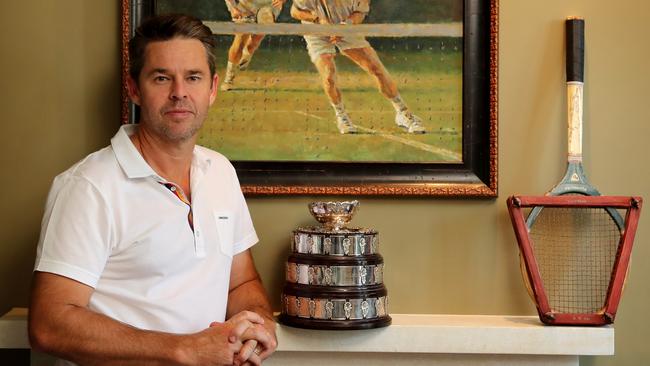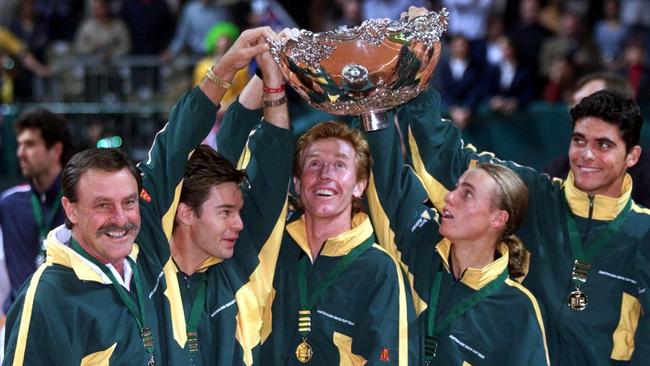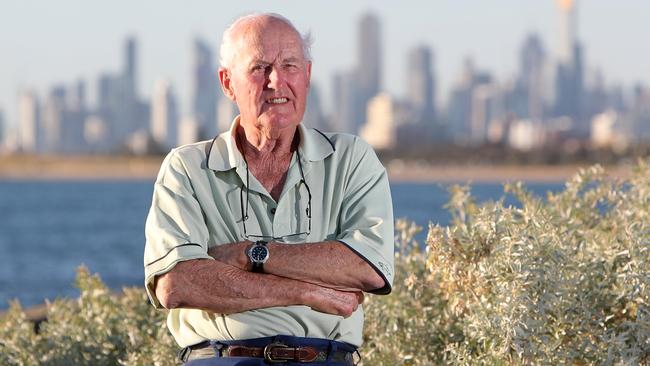Davis Cup greats dismayed over plan to dump century of tradition for fast format
Tennis’s governing body is planning to scrap the Davis Cup’s traditional format and replace it with a seven-day event.

For almost a quarter of a century, Neale Fraser was Australia’s captain and conscience, guiding our best tennis players on a perennial quest for one of the world’s great sporting trophies, the Davis Cup.
After learning of radical plans by sport’s international governing body to scrap the competition’s traditional format and replace it with a seven-day tournament, the 84-year-old spat out his dismay.
“It would be disastrous,” Fraser told The Australian. “The Davis Cup is one of the greatest competitions in the world in any sport and they are trying to crucify it by having it over one week. They may as well throw the ball up in the air and see where it lands to decide a winner.”
The proposed changes have blindsided Davis Cup legends such as Pat Cash, who described them as “un-f..king-believable”, and Todd Woodbridge — a member of the last two Australian teams to win the cup, in 1999 and 2003 — who questioned how such changes could be proposed without extensive consultation.
“They are trying to put a band-aid on issues without going through the proper consultation or doing their due diligence,” Woodbridge said.
“Just changing the date to a one-week format won’t make it work. There is no doubt that things need to be done differently but you can’t just throw ideas out there and hope they stick.”

Since 1905, when Norman Brookes led Australia’s first raiding party onto the grass courts of London’s Queen’s Club, the Davis Cup has been a part of our sporting tradition. For a time, we barely let the trophy our of our sights, with Harry Hopman winning a record 16 as captain and Roy Emerson as a player.
Now, the International Tennis Federation proposes to end home-and-away rounds and reduce it to a one-week, partly round-robin competition played in a neutral city each November.
Rubbers would be played over three sets instead of the best-of-five format that has produced some of the sport’s most dramatic moments. Ties would feature just two singles rubbers and a doubles, be completed within a day and no longer feature the gruelling, reverse singles classics that have enthralled a nation from Kooyong to White City to Melbourne Park, where they still talk of Lleyton Hewitt’s five-set comeback against Roger Federer in 2003.
The move by the ITF, which it describes it as a “game-changing” moment for the sport, coincides with a 25-year, $3 billion partnership with investment group Kosmos, founded by Barcelona soccer star Gerard Pique. The competition would be renamed the World Cup of Tennis Finals and remove home-court advantage, but the trophy would still be called the Davis Cup.
The proposed change comes at a time when not all major stars are committed to the competition and amid concerns about the cost of running the Davis Cup in its traditional format.
Cash, who performed heroically under Fraser in Australia’s nail-biting triumphs over Sweden at Kooyong, was incredulous.

The 1987 Wimbledon champion said tennis risked losing part of its soul by getting rid of the home-and-away format that gives Davis Cup its unique character and variability.
He said holding the tournament at a neutral venue would deny young Australians and children from other tennis nations the chance to watch current stars play for their country.
“It is un-f..king-believable,” he said. “It is a disaster for tennis worldwide. This is going to ruin tennis. It is almost laughable at how destructive this will be for tennis, for juniors.”
Woodbridge, who spent the past two months working at the Australian Open and at Davis and Fed Cup ties, said not one individual had mentioned the possibility of a change of such magnitude.
Newcombe Medallist Sam Groth, who kept Australia alive in a quarter-final against Kazakhstan in Darwin in 2015, was succinct. “It is no longer the Davis Cup,” he said. “If the ITF wants to create an event like this, don’t go calling it the Davis Cup.”
Australian captain Lleyton Hewitt was unavailable for comment as he is the Bahamas preparing Australia’s latest Davis Cup tyro, Alex de Minaur, for an event in Indian Wells next week. A spokesman for Hewitt pointed to the dual winner’s staunch respect of the tradition of the Davis Cup and his pride representing Australia as an indication of how he would view the changes.
The proposal will go to a vote of ITF nations at a meeting in Florida in August.
A bid to reduce the format to best of three sets was voted down last year by member nations. The ITF will need a two-thirds majority to get the format through. Belgium, a finalist last year, has indicated it will vote against it.
Fraser, who led Davis Cup campaigns for a record 24 years, now wants Australian officials to lead the fight to preserve it. “I just think it is a disaster and I am hopeful that Australia is strong enough to convince other nations to take a stand,” he said.





To join the conversation, please log in. Don't have an account? Register
Join the conversation, you are commenting as Logout